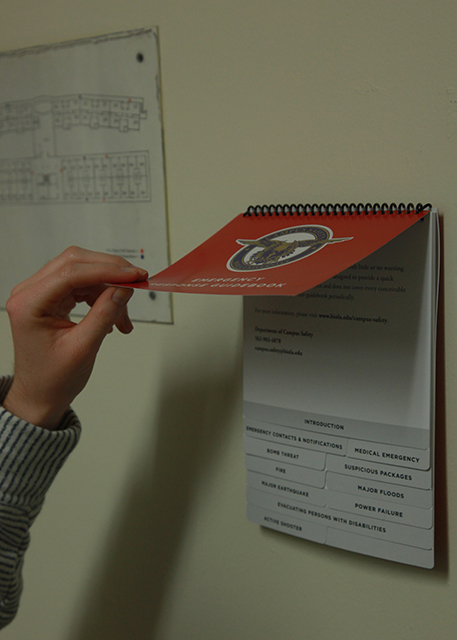Over the interterm, Campus Safety installed emergency response guidebooks in offices, classrooms and Biola housing in order to ensure students and employees would be well equipped in the case of an emergency.
In case of emergency
Campus Safety began working on the the guidebook in July 2016 to include information regarding what to do during an earthquake, fire, a power failure, a bomb threat or an active shooting. Chief John Ojeisekhoba explains their intent is to help students and employees be proactive in dangerous situations.
“We really wanted to put out more information to students and employees so that [they] would be able to know what to do in the event of a major emergency on campus,” Ojeisekhoba said.
Campus Safety created the guidebooks alongside the Emergency Response Team and University Communications and Marketing and had facilities management install them.
Increased precautions
As a response to student recommendations, Campus Safety is currently installing a Public Address System ehich allows Campus Safety dispatchers to make emergency announcements through speakers placed throughout Biola’s campus. Students and employees will now hear the announcement on campus in addition to receiving text and email notification.
Campus Safety will also bring in an earthquake simulator next semester, which will hold up to eight students at a time. Then, on March 8, there will be an active shooter lockdown exercise where both Los Angeles Sheriff’s Department and Campus Safety personnel will actively respond to students and teachers, analogous to a real emergency situation.
Heard and secure
They considered concerns from employees and students, like Noah Becker, freshman biblical studies major, who now feels heard and secure.
“They managed to fit a lot of information in a pretty small notebook,” Becker said. “When I flipped through it, I didn’t think of any other emergencies that they didn’t address.”
The emergency response guidebook is one piece of the overarching plan to keep Biola’s community safe, using planning ahead as their biggest asset.
Ben Somes, junior intercultural studies major, suggested adding seminars to accompany the guidelines laid out in the guidebook to ensure the awareness of protocols.
“[A seminar] is something that someone is forced to do whether they read the booklet or not,” Somes said. “You will hopefully gain that information if you’re paying attention.”







